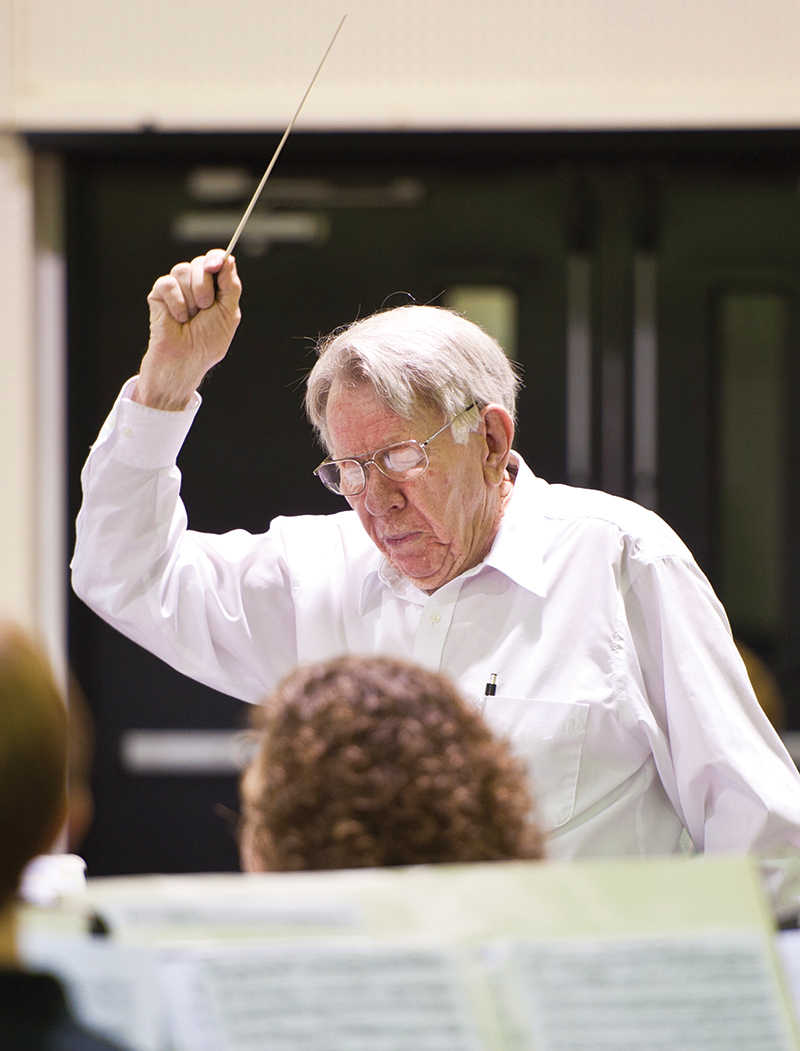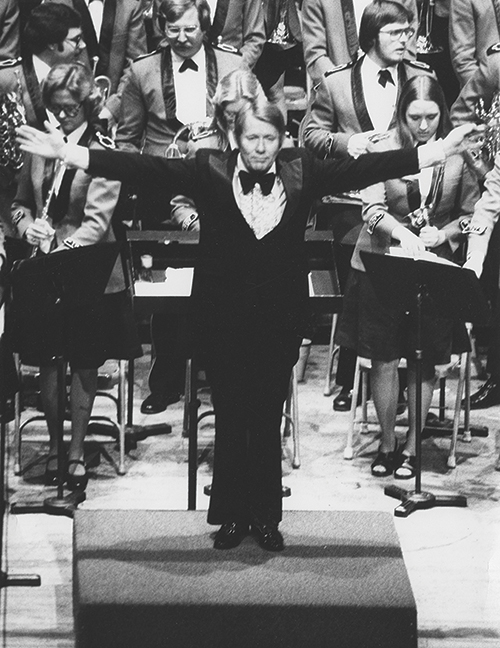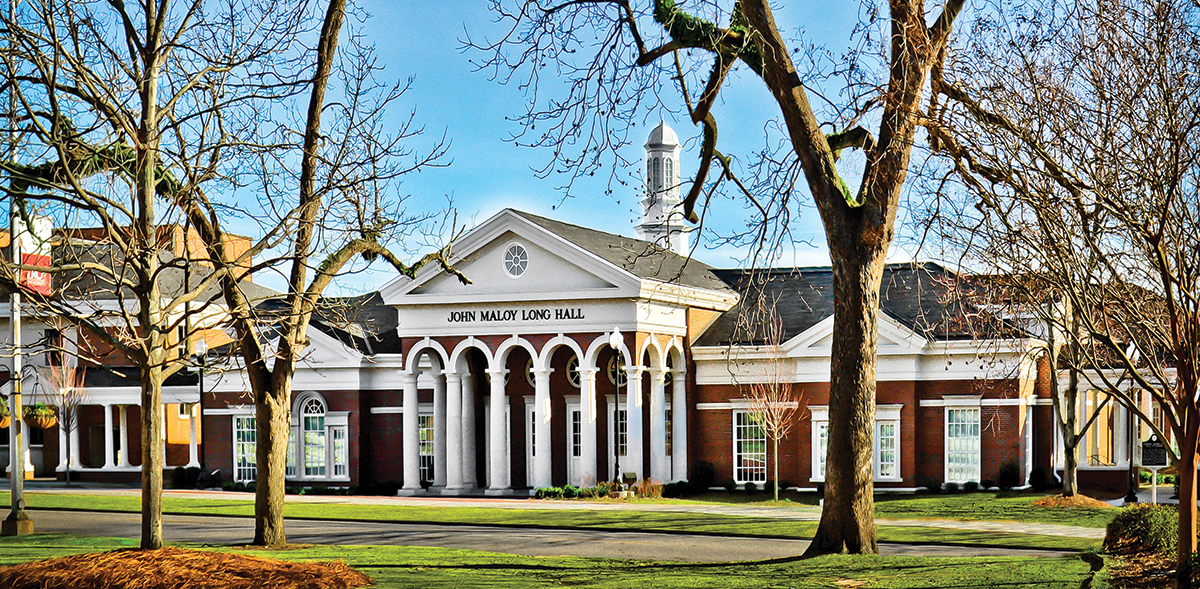
Legendary John Long has influenced generations
By Emmett Burnett
Photos by Kevin Glackmeyer and courtesy Troy University
My first encounter with Dr. John Maloy Long was as a journalism student, interviewing him for a class assignment at Troy (back then it was State) University. In 1975, he was a campus legend. In 2015, he still is.
Visiting his suburban Troy, Alabama, home, I reminded the 89-year-old director of bands emeritus of that four-decade-old homework assignment.
“Glad I could help,” he replies. “How did you do?”
He wasn’t joking. “Dr. Long is a kind, thoughtful and helpful person who puts the needs of others before his own,” said Troy University’s director of bands, Dr. Mark Walker. “He is a lifelong learner who still loves bands, band music and band people.”
And Long remembers them like yesterday. “I don’t think I’ve ever had a student I did not like or learn from,” he notes, pointing at photographs in scrapbooked memorabilia. He effortlessly recollects names, dates, and instruments of apprentices. More than 400 followed his lead and are band directors across the U.S.
Facing age 90, his visits to the beloved campus he waved a baton over for 32 years have decreased. “He only goes there now about three times a week,” laughs wife Mary Lynn. But almost two decades after retirement, he still maintains an office at the university with two buildings and a street named for him.
In the mid-1960s, Long heeded Troy’s call from its former president, Dr. Ralph Adams. The two were introduced by Gov. George Wallace, a mutual friend. Long was the 10-year band director of Montgomery’s Robert E. Lee High School when he graduated from prep school to college league.
“I wasn’t sure how I would do in university-level band,” he adds. “But Dr. Adams vowed the school’s support and it has endured to this day.”
The first day on the job was in 1965, the same year Long performed a campus makeover. “I was driving to work and wondering what to call the band,” he recalled about the morning commute. “Somewhere between Montgomery and Troy it hit me, ‘Sound of the South.’” Fifty years later, the name still stands.
Long invented the college color guard. He installed military drills, jazz, pop, country, and hymns: High-stepping marching musicians performed a variety show that might reverently croon “Precious Lord Take Me Home,” and then blast Elvis’ “I Can’t Stop Loving You.” Blues standards, jazz hits and pop favorites rocked the arena as Long transformed halftime into show time.
The maestro is emphatic: “A good band show has a little of everything. It is a thing of beauty and there is nothing like it. Maybe I’m just an old worn-out musician, but I believed in giving people what they want. Entertain the audience; don’t play down to it.
“Good music is never old and a marching band should play marching music,” he adds. He did and others noticed.
“Few individuals have had a greater impact on Troy University than Dr. John Long,” says Dr. Jack Hawkins, Troy University president. “As the founding director of the Sound of the South, he created the most famous organization at Troy. His impact extends far beyond the walls of Troy.”
Long was the first active bandmaster elected to the Alabama Bandmasters Hall of Fame and the only band director ever given the Alabama Council of the Arts Governor’s Award. In 2012 the Kennedy Center for the Performing Arts in Washington, D.C., named him one of the top ten teachers in the U.S. He has been featured on the “CBS News” and ABC’s “Good Morning America.”
During his Troy tenure, his Sound of the South performed in venues across America, including bowl games and four presidential inaugurations. “President Nixon walked up to me, extended his hand, and said, ‘Hi, I’m Richard Nixon,’ – like I wouldn’t know this?” Long chuckles.
A native of Guntersville, Long’s first musical gig came in 1944 when his high school band teacher was drafted into the army. The principal asked the teenage trumpet player to lead fellow musicians until a replacement was named. Long had his calling, but so did Uncle Sam.
 He, too, joined the Army the day after high school graduation, performing in military bands in the company of Bob Hope, Jack Benny and stars of the 1940s. After the service, he studied to become a lawyer, but not for long.
He, too, joined the Army the day after high school graduation, performing in military bands in the company of Bob Hope, Jack Benny and stars of the 1940s. After the service, he studied to become a lawyer, but not for long.
Music beckoned and so did a job as band director in Oneonta, where he met a student color guard member. Goodbye law degree. Hello, music career and hello, Mary Lynn. “I owe everything to this wonderful girl,” he smiles, glancing at his wife of 65 years.
Long’s wife recalls, “He was the director; I carried the American flag in his band,” and she adds with a laugh, “John received permission from the principal and my parents to take me to church.” They married in the spring of 1949.
He also led high school bands in Ft. Payne and then Robert E. Lee in Montgomery before assuming his Troy University legacy. “I was fortunate to work with great men like Dr. Adams and Dr. Hawkins,” he says.
President Hawkins adds, “Dr. Long is a teacher first, but Troy alumni in all fields, from medicine to business to law, have benefited from his wisdom. He is an institution within an institution.”
And he is the master of what acquaintances call “Longisms.”
“He had so many quotable quotes, we would repeat them to our own kids through the years,” recalls former band student and Troy University Chief of Police, John McCall. Some favorites:
“There’s only one job you can get where you start at the top: ditch digging.”
“There’s nothing greater than being a broke college student and there’s nothing sadder than being a broke college graduate.”
“Band is spelled, F-U-N.”
His passion is kindled with concern. “Music broadens your horizons,” Long said. “It makes you appreciate living more. But unfortunately I see many schools – high schools and colleges — cutting back. It worries me. But of course music is my life, what else would I say?” he smiles.
And after a pause of reflection, he states his philosophy, “Music is a lifetime of joy. It has been for me. No matter how technological you get, there is always joy in music.” A





